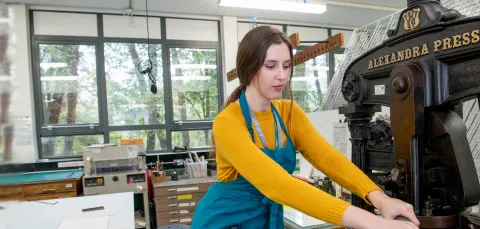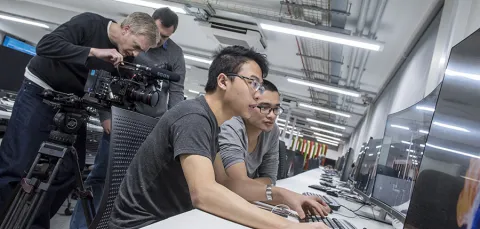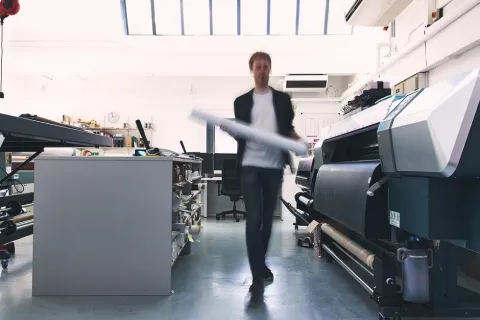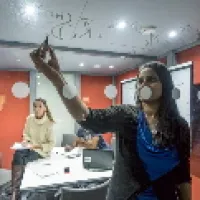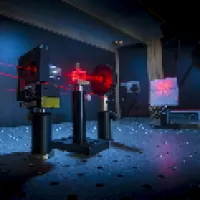About this course
Design and build innovative digital experiences that bring art, science, and technology together on our creative computing degree. You'll get the experience you need to succeed in creative digital industries, using sculpture and fabrication, textiles, and 3D printing.
Build your strengths and skills in team production and design systems thinking. You'll use industry-standard technology and philosophical and ethical approaches throughout this creative computing course. Creating digital projects that relate to culture, society, and the environment.
You'll research the aesthetic, sustainable, and political aspects of computer media formats including:
- networks
- social media
- digital games
- open source and activist initiatives
As a creative computing student, you'll benefit from:
- virtual reality, augmented reality, robot design and programming systems
- access to fabrication and construction equipment
- working directly with the research labs focusing on social and collaborative computing
- guest speakers and taking part in industry events and projects across the whole School of Art
- chances to showcase your work both in the UK and internationally
- optional study trips abroad and in the UK, to visit museums, galleries, and industry events
Year in industry
You'll have the option to apply to spend an extra year working in industry to develop your workplace experience. The year in employment offers you the chance to complete a work placement between part 2 and part 3 of your degree. If you pass, you will graduate with 'Year in Employment' on your degree certificate.
Year abroad
You'll have the option to spend an extra year studying abroad, where you will be able to choose to join a programme with one of our partner universities worldwide between Parts 2 and 3. This provides you with an opportunity to enrich your academic learning by experiencing a different academic environment in a vibrant cultural context. If you Pass, you will graduate with 'a Year Abroad' on your degree certificate.
We regularly review our courses to ensure and improve quality. This course may be revised as a result of this. Any revision will be balanced against the requirement that the student should receive the educational service expected. Find out why, when, and how we might make changes.
Our courses are regulated in England by the Office for Students (OfS).
Learn more about these subject areas
Course location
This course is based at Winchester.
Awarding body
This qualification is awarded by the University of Southampton.
Download the Course Description Document
The Course Description Document details your course overview, your course structure and how your course is taught and assessed.
Entry requirements
For Academic year 202526
A-levels
Our standard offer is BBB including a creative, humanities and/or computing subject at A-level or equivalent qualification, we also consider grades of comparable value and offer on these taking into account the suitability of the portfolio submission for the intended course.
A-levels additional information
A Level offers typically exclude General Studies and Critical Thinking.
A-levels with Extended Project Qualification
If you are taking an EPQ in addition to 3 A levels, you will receive the following offer in addition to the standard A level offer: BBC and grade A in the EPQ.
A-levels contextual offer
We are committed to ensuring that all applicants with the potential to succeed, regardless of their background, are encouraged to apply to study with us. The additional information gained through contextual data allows us to recognise an applicant's potential to succeed in the context of their background and experience. Applicants who are highlighted in this way will be made an offer which is lower than the typical offer for that programme.
International Baccalaureate Diploma
Pass, with 30 points overall with 15 points at Higher Level including a creative, humanities, and/or computing subject.
International Baccalaureate contextual offer
We are committed to ensuring that all learners with the potential to succeed, regardless of their background, are encouraged to apply to study with us. The additional information gained through contextual data allows us to recognise a learner’s potential to succeed in the context of their background and experience. Applicants who are highlighted in this way will be made an offer which is lower than the typical offer for that programme.
International Baccalaureate Career Programme (IBCP) statement
Offers will be made on the individual Diploma Course subject(s) and the career-related study qualification. The CP core will not form part of the offer. Where there is a subject pre-requisite(s), applicants will be required to study the subject(s) at Higher Level in the Diploma course subject and/or take a specified unit in the career-related study qualification. Applicants may also be asked to achieve a specific grade in those elements. Please see the University of Southampton International Baccalaureate Career-Related Programme (IBCP) Statement for further information. Applicants are advised to contact their Faculty Admissions Office for more information.
BTEC
Distinction, Distinction, Merit in the BTEC National Extended Diploma in a creative, humanities, and/or computing subject. Distinction, Distinction in the BTEC National Diploma plus B in an A level including a creative, humanities, and/or computing subject. Distinction in the BTEC National Extended Certificate plus BB in two A levels including a creative, humanities, and/or computing subject.
RQF BTEC
We are committed to ensuring that all learners with the potential to succeed, regardless of their background, are encouraged to apply to study with us. The additional information gained through contextual data allows us to recognise a learner’s potential to succeed in the context of their background and experience. Applicants who are highlighted in this way will be made an offer which is lower than the typical offer for that programme.
QCF BTEC
Distinction, Distinction, Merit in the BTEC Extended Diploma in a creative, humanities, and/or computing subject. Distinction, Distinction in the BTEC Diploma plus B in an A level in a creative, humanities, and/or computing subject. Distinction in the BTEC Subsidiary Diploma plus BB in two A levels including a creative, humanities, and/or computing subject.
We are committed to ensuring that all learners with the potential to succeed, regardless of their background, are encouraged to apply to study with us. The additional information gained through contextual data allows us to recognise a learner’s potential to succeed in the context of their background and experience. Applicants who are highlighted in this way will be made an offer which is lower than the typical offer for that programme.
Access to HE Diploma
60 credits with a minimum of 45 credits at Level 3, of which 24 must be at Distinction and 21 credits at Merit including a creative, humanities, and/or computing subject.
Irish Leaving Certificate
Irish Leaving Certificate (first awarded 2017)
H2 H2 H3 H3 H3 H3 including a creative, humanities, and/or computing subject.
Irish Leaving Certificate (first awarded 2016)
B1 B1 B1 B1 B2 B2 including a creative, humanities, and/or computing subject.
Scottish Qualification
Offers will be based on exams being taken at the end of S6. Subjects taken and qualifications achieved in S5 will be reviewed. Careful consideration will be given to an individual’s academic achievement, taking in to account the context and circumstances of their pre-university education.
Please see the University of Southampton’s Curriculum for Excellence Scotland Statement (PDF) for further information. Applicants are advised to contact their Faculty Admissions Office for more information.
Cambridge Pre-U
M2 M2 M2 in three principal subjects including a creative, humanities, and/or computing subject.
Welsh Baccalaureate
BBB from 3 A levels including a creative, humanities, and/or computing subject or BB from two A levels including a creative, humanities, and/or computing subject and B from the Advanced Welsh Baccalaureate Skills Challenge Certificate
Welsh Baccalaureate additional information
Offers typically exclude General Studies and Critical Thinking.
Welsh Baccalaureate contextual offer
We are committed to ensuring that all learners with the potential to succeed, regardless of their background, are encouraged to apply to study with us. The additional information gained through contextual data allows us to recognise a learner’s potential to succeed in the context of their background and experience. Applicants who are highlighted in this way will be made an offer which is lower than the typical offer for that programme.
T-Level
T Level in Digital Production, Design and Development at Merit overall with B in Core and Merit in Specialism.
Other requirements
GCSE requirements
Applicants must hold GCSE English language (or GCSE English) (minimum grade 4/C) and mathematics (minimum grade 4/C)
Find the equivalent international qualifications for our entry requirements.
English language requirements
If English isn't your first language, you'll need to complete an International English Language Testing System (IELTS) to demonstrate your competence in English. You'll need all of the following scores as a minimum:
IELTS score requirements
- overall score
- 6.5
- reading
- 6.0
- writing
- 6.0
- speaking
- 6.0
- listening
- 6.0
We accept other English language tests. Find out which English language tests we accept.
If you don’t meet the English language requirements, you can achieve the level you need by completing a pre-sessional English programme before you start your course.
You might meet our criteria in other ways if you do not have the qualifications we need. Find out more about:
- our Ignite your Journey scheme for students living permanently in the UK (including residential summer school, application support and scholarship)
- skills you might have gained through work or other life experiences (otherwise known as recognition of prior learning)
Find out more about our Admissions Policy.
Foundation programmes for international students
A foundation programme will give you the language skills and subject knowledge you need if you're not qualified for direct entry to your chosen undergraduate course.
You'll progress to your chosen course after successfully completing the foundation programme.
Find out more about undergraduate foundation programmes for international students.
Non-academic entry requirements
All applicants will need to provide a portfolio of art work
Got a question?
Please contact our enquiries team if you're not sure that you have the right experience or qualifications to get onto this course.
Email: enquiries@southampton.ac.uk
Tel: +44(0)23 8059 5000
Course structure
You can choose modules that suit your interests and career goals.
You can focus on programming skills, user experience design, or building digital projects through sculpture and fabrication, textiles or 3D printing. Whatever you decide, you will gain experience in team production.
Year 1 overview
You'll learn principles of programming for creative technological applications such as augmented reality, robotics and pervasive computing. You'll test out your skills and study histories and theories of these technologies.
Year 2 overview
Workshops and lectures will help you build on your tech skills and follow your interests in the projects you develop. You'll engage with user experience research and interactive systems for commercial, entertainment, or activist assignments.
In the second half of the year, you can take an international study exchange or choose modules preparing you for the creative industries.
Year 3 overview
You'll develop a major project to explore your creative insights, ideas and tech skills in depth. You will get technical support throughout.
Want more detail? See all the modules in the course.
Modules
The modules outlined provide examples of what you can expect to learn on this degree course based on recent academic teaching. As a research-led University, we undertake a continuous review of our course to ensure quality enhancement and to manage our resources. The precise modules available to you in future years may vary depending on staff availability and research interests, new topics of study, timetabling and student demand. Find out why, when and how we might make changes.
For entry in academic year 2025 to 2026
Year 1 modules
You must study the following modules in year 1:
Algorithmic Thinking & Methods
This module builds on the foundational skills and knowledge established in Creative Computing I to develop a more sustained application of coding to creative technological approaches to art and design. You will be introduced to more advanced programming p...
Creative Computing I: introduction to programming
This module introduces you to principles of programming for creative applications. Using accessible platforms including block-based coding, simple robotics and front-end web design you will work on exercises that will quickly develop your technical skills...
Introduction to Digital Culture
This module introduces you to key theoretical, cultural and historical aspects of computing in art, design, industry, entertainment and everyday life. You will explore and respond to these aspects through digital media production and presentation, develop...
Pervasive Media Exploration
This module explores new possibilities for creative computing beyond the computer screen. Through group work you will devise a prototype project for a non-screen based experience that might be, for example, a location-aware or geolocation-based applicatio...
Year 2 modules
You must study the following modules in year 2:
Collaborate (Creative Computing)
This module encourages you to see your developing expertise in creative computing in wider interdisciplinary contexts. Through a group project you will collaborate with students and / or practitioners from other disciplines or will be set briefs from prof...
Creative Computing II: applied programming
In this module you will build on your technical and creative practice in programming to explore the possibilities of applied and pervasive computing. Through workshops you will experiment with hardware and material systems that might include wearable tech...
Creative Industries
This module asks you to engage with and critically reflect on areas of the creative and cultural industries in relation to your career aspirations and with consideration of issues of sustainability and EDI. You will undertake short projects in response to...
Interactivity & Play
In this module you will build on your technical skills and creative approaches to develop an individual creative computing project. The broad themes of play and user interaction will be explored, within which you will identify, research and manage a proje...
You must also choose from the following modules in year 2:
WSA Year Abroad
This non-credit bearing module is a compulsory module designed to provide support and engagement with your WSA tutors if you decide to take the option of a Year Abroad between Part 2 and Part 3 of your degree programme. Your dedicated study abroad coor...
Year in Employment
The Year in Employment (YiE) is an opportunity for undergraduate students across a range of programmes to undertake a placement year whilst remaining enrolled to the University of Southampton. Students complete their placement after their second year of s...
Year 3 modules
You must study the following modules in year 3:
Experimental Practice & Research
This module builds on the level 5 Creative Industry module, addressing the current industrial context for creative computing and technology and preparation for future careers or further study. You will conduct further research into an area of creative wor...
Final Project 1
In this module you will conduct theoretical research for your Final Project. You will engage with critical issues, contexts and questions, and identify significant practitioners and creative bodies to inform your creative practice. You will develop your p...
Final Project 2
In this module you will develop a major individual or team-based project in creative computing. You will explore critical issues, contexts and questions, using appropriate technical processes and platforms, to realise your ideas and research questions. Yo...
Professional Planning (Creative Computing)
This module aims to equip you with the necessary tools to maximise your success of gaining employment and securing a successful career in your designated discipline or establishing a plan for further study. Professional Planning focuses on career plann...
Prototyping, Presentation & Evaluation
In this module you will begin to develop creative, practical and theoretical ideas for your Final Project. You will explore the possibilities for this project through a series of prototypes, some individual and some team-based. These will be a mixture of ...
Learning and assessment
The learning activities for this course include the following:
- lectures
- classes and tutorials
- coursework
- individual and group projects
- independent learning (studying on your own)
Academic support
You’ll be supported by a personal academic tutor and have access to a senior tutor.
Course leader
Julian Stadon is the course leader.
Careers and employability
The employability and enterprise skills you'll gain from this course are reflected in the Southampton skills model. When you join us you'll be able to use our skills model to track, plan, and benefit your career development and progress.
Download skills overview
Career pathways
Graduates commonly work in a range of organisations or sectors including:
Games Studios,
Production Companies,
Advertising and Broadcasting Companies,
Creative Agencies,
PR and Communications Firms,
Education Providers,
Software Developers.
- Machine learning developer
- Mobile developer
- Video game developer
- Computer music engineer
- Full stack web developer
- E-learning programmer
- Application programmer
- UX designer
- Creative technologist
- Software engineer
- Data analyst
- Database manager
- Graphic designer
- Multimedia artist
- Artificial intelligence specialist
- Augmented reality developer
- Digital marketing specialist
- Computer scientist
- Data scientist
- Software engineer
- Software developer
- Technical consultant
- Technology analyst
- Web developer

Year in employment
You can apply for a year in employment placement on this course. This is a great way to improve your employability and confidence in your career prospects. Recommended by 100% of students who've taken part, you can apply for a UK or global placement in any sector.
Careers services and support
We are a top 20 UK university for employability (QS Graduate Employability Rankings 2022). Our Careers, Employability and Student Enterprise team will support you. This support includes:
- work experience schemes
- CV and interview skills and workshops
- networking events
- careers fairs attended by top employers
- a wealth of volunteering opportunities
- study abroad and summer school opportunities
We have a vibrant entrepreneurship culture and our dedicated start-up supporter, Futureworlds, is open to every student.
Your career ideas and graduate job opportunities may change while you're at university. So it is important to take time to regularly reflect on your goals, speak to people in industry and seek advice and up-to-date information from Careers, Employability and Student Enterprise professionals at the University.
Fees, costs and funding
Tuition fees
Fees for a year's study:
- UK students pay £9,535.
- EU and international students pay £26,300.
What your fees pay for
Your tuition fees pay for the full cost of tuition and standard exams.
Find out how to:
Accommodation and living costs, such as travel and food, are not included in your tuition fees. There may also be extra costs for retake and professional exams.
Explore:
Bursaries, scholarships and other funding
If you're a UK or EU student and your household income is under £25,000 a year, you may be able to get a University of Southampton bursary to help with your living costs. Find out about bursaries and other funding we offer at Southampton.
If you're a care leaver or estranged from your parents, you may be able to get a specific bursary.
Get in touch for advice about student money matters.
Scholarships and grants
You may be able to get a scholarship or grant to help fund your studies.
We award scholarships and grants for travel, academic excellence, or to students from under-represented backgrounds.
Support during your course
The Student Hub offers support and advice on money to students. You may be able to access our Student Support fund and other sources of financial support during your course.
Funding for EU and international students
Find out about funding you could get as an international student.
How to apply
What happens after you apply?
We will assess your application on the strength of your:
- predicted grades
- academic achievements
- personal statement
- academic reference
Portfolio guidance
Your portfolio is one of the most important parts of your application. It is your opportunity to show us your work, and our opportunity to find out more about you. You may not have presented your work before, so here is some guidance with preparing your portfolio.
What do you want to see in my portfolio?
Your portfolio should demonstrate a lively, inventive approach to the development of creative or computing projects. As well as school and college projects you can include your own self-initiated work. It should be carefully selected as this will show us your skill and abilities, and most importantly your vision.
Your portfolio should clearly demonstrate the development of your ideas and their range. It might include sketches, mood boards, videos of programs you have made, photographs, creative writing, storyboards, outlines of game, app or project ideas. A clear demonstration of creative and practical process are the main focus of the portfolio review.
How many pieces should I include?
We would suggest a maximum of 25 pieces of work, including sketchbooks. Your work should have been produced within the past two years, although earlier work can be included if it is particularly relevant to your interests and development.
Will I be expected to have an in‐depth knowledge of programming skills?
We have no expectation of prior programming experience, although, as programming is an integral part of the degree, some past experience is desirable and will strengthen your application.
Information for Mature students
We understand that mature students may not have work that is structured in the same way as A-Level or Foundation students. We are, however, still interested in seeing self-initiated work, including sketchbooks and finished pieces. Work-based creative or computing experience can be included. We also understand that some applicants may wish to include work that is over two years old – but make sure that you include as much recent work as possible in your portfolio.
Top tip
Tailor your portfolio to the course you are applying to. Investigate the Creative Computing programme thoroughly before making your selection for your portfolio. Remember that courses with the same name at different universities can vary greatly.
We'll aim to process your application within 2 to 6 weeks, but this will depend on when it is submitted. Applications submitted in January, particularly near to the UCAS equal consideration deadline, might take substantially longer to be processed due to the high volume received at that time.
Equality and diversity
We treat and select everyone in line with our Equality and Diversity Statement.
Got a question?
Please contact our enquiries team if you're not sure that you have the right experience or qualifications to get onto this course.
Email: enquiries@southampton.ac.uk
Tel: +44(0)23 8059 5000
Related courses
Creative Computing (BSc) is a course in the Art, design and fashion and Computer science and software engineering subject areas. Here are some other courses within these subject areas:
-
Study
- View all courses
- Taught postgraduate study
- Pre-sessional English courses
-
Subjects
- Acoustical engineering
- Audiology
- Biomedical and medical engineering
- Civil engineering
- Every day I’m completely immersed in an environment that’s creative in all aspects
- Everything I learn feels so relevant, even If it’s a subject rooted in the past
- Maritime engineering
- Photonics and optoelectronics
- Social statistics and demography
-
PhDs and research degrees
- Create your own research project
-
Find a PhD project
- A missing link between continental shelves and the deep sea: Have we underestimated the importance of land-detached canyons?
- A study of rolling contact fatigue in electric vehicles (EVs)
- Acoustic monitoring of forest exploitation to establish community perspectives of sustainable hunting
- Acoustic sensing and characterisation of soil organic matter
- Advancing intersectional geographies of diaspora-led development in times of multiple crises
- Aero engine fan wake turbulence – Simulation and wind tunnel experiments
- Against Climate Change (DACC): improving the estimates of forest fire smoke emissions
- All-in-one Mars in-situ resource utilisation (ISRU) system and life-supporting using non-thermal plasma
- An electromagnetic study of the continent-ocean transition southwest of the UK
- An investigation of the relationship between health, home and law in the context of poor and precarious housing, and complex and advanced illness
- Antibiotic resistance genes in chalk streams
- Being autistic in care: Understanding differences in care experiences including breakdowns in placements for autistic and non-autistic children
- Biogeochemical cycling in the critical coastal zone: Developing novel methods to make reliable measurements of geochemical fluxes in permeable sediments
- Bloom and bust: seasonal cycles of phytoplankton and carbon flux
- British Black Lives Matter: The emergence of a modern civil rights movement
- Building physics for low carbon comfort using artificial intelligence
- Building-resolved large-eddy simulations of wind and dispersion over a city scale urban area
- Business studies and management: accounting
- Business studies and management: banking and finance
- Business studies and management: decision analytics and risk
- Business studies and management: digital and data driven marketing
- Business studies and management: human resources (HR) management and organisational behaviour
- Business studies and management: strategy, innovation and entrepreneurship
- Carbon storage in reactive rock systems: determining the coupling of geo-chemo-mechanical processes in reactive transport
- Cascading hazards from the largest volcanic eruption in over a century: What happened when Hunga Tonga-Hunga Ha’apai erupted in January 2022?
- Characterisation of cast austenitic stainless steels using ultrasonic backscatter and artificial intelligence
- Climate Change effects on the developmental physiology of the small-spotted catshark
- Climate at the time of the Human settlement of the Eastern Pacific
- Collaborative privacy in data marketplaces
- Compatibility of climate and biodiversity targets under future land use change
- Cost of living in modern and fossil animals
- Creative clusters in rural, coastal and post-industrial towns
- Deep oceanic convection: the outsized role of small-scale processes
- Defect categories and their realisation in supersymmetric gauge theory
- Defining the Marine Fisheries-Energy-Environment Nexus: Learning from shocks to enhance natural resource resilience
- Design and fabrication of next generation optical fibres
- Developing a practical application of unmanned aerial vehicle technologies for conservation research and monitoring of endangered wildlife
- Development and evolution of animal biomineral skeletons
- Development of all-in-one in-situ resource utilisation system for crewed Mars exploration missions
- Ecological role of offshore artificial structures
- Effect of embankment and subgrade weathering on railway track performance
- Efficient ‘whole-life’ anchoring systems for offshore floating renewables
- Electrochemical sensing of the sea surface microlayer
- Engagement with nature among children from minority ethnic backgrounds
- Enhancing UAV manoeuvres and control using distributed sensor arrays
- Ensuring the Safety and Security of Autonomous Cyber-Physical Systems
- Environmental and genetic determinants of Brassica crop damage by the agricultural pest Diamondback moth
- Estimating marine mammal abundance and distribution from passive acoustic and biotelemetry data
- Evolution of symbiosis in a warmer world
- Examining evolutionary loss of calcification in coccolithophores
- Explainable AI (XAI) for health
- Explaining process, pattern and dynamics of marine predator hotspots in the Southern Ocean
- Exploring dynamics of natural capital in coastal barrier systems
- Exploring the mechanisms of microplastics incorporation and their influence on the functioning of coral holobionts
- Exploring the potential electrical activity of gut for healthcare and wellbeing
- Exploring the trans-local nature of cultural scene
- Facilitating forest restoration sustainability of tropical swidden agriculture
- Faulting, fluids and geohazards within subduction zone forearcs
- Faulting, magmatism and fluid flow during volcanic rifting in East Africa
- Fingerprinting environmental releases from nuclear facilities
- Flexible hybrid thermoelectric materials for wearable energy harvesting
- Floating hydrokinetic power converter
- Glacial sedimentology associated subglacial hydrology
- Green and sustainable Internet of Things
- How do antimicrobial peptides alter T cell cytokine production?
- How do calcifying marine organisms grow? Determining the role of non-classical precipitation processes in biogenic marine calcite formation
- How do neutrophils alter T cell metabolism?
- How well can we predict future changes in biodiversity using machine learning?
- Hydrant dynamics for acoustic leak detection in water pipes
- If ‘Black Lives Matter’, do ‘Asian Lives Matter’ too? Impact trajectories of organisation activism on wellbeing of ethnic minority communities
- Illuminating luciferin bioluminescence in dinoflagellates
- Imaging quantum materials with an XFEL
- Impact of neuromodulating drugs on gut microbiome homeostasis
- Impact of pharmaceuticals in the marine environment in a changing world
- Improving subsea navigation using environment observations for long term autonomy
- Information theoretic methods for sensor management
- Installation effect on the noise of small high speed fans
- Integrated earth observation mapping change land sea
- Interconnections of past greenhouse climates
- Investigating IgG cell depletion mechanisms
- Is ocean mixing upside down? How mixing processes drive upwelling in a deep-ocean basin
- Landing gear aerodynamics and aeroacoustics
- Lightweight gas storage: real-world strategies for the hydrogen economy
- Machine learning for multi-robot perception
- Machine learning for multi-robot perception
- Marine ecosystem responses to past climate change and its oceanographic impacts
- Mechanical effects in the surf zone - in situ electrochemical sensing
- Microfluidic cell isolation systems for sepsis
- Migrant entrepreneurship, gender and generation: context and family dynamics in small town Britain
- Miniaturisation in fishes: evolutionary and ecological perspectives
- Modelling high-power fibre laser and amplifier stability
- Modelling soil dewatering and recharge for cost-effective and climate resilient infrastructure
- Modelling the evolution of adaptive responses to climate change across spatial landscapes
- Nanomaterials sensors for biomedicine and/or the environment
- New high-resolution observations of ocean surface current and winds from innovative airborne and satellite measurements
- New perspectives on ocean photosynthesis
- Novel methods of detecting carbon cycling pathways in lakes and their impact on ecosystem change
- Novel technologies for cyber-physical security
- Novel transparent conducting films with unusual optoelectronic properties
- Novel wavelength fibre lasers for industrial applications
- Ocean circulation and the Southern Ocean carbon sink
- Ocean influence on recent climate extremes
- Ocean methane sensing using novel surface plasmon resonance technology
- Ocean physics and ecology: can robots disentangle the mix?
- Ocean-based Carbon Dioxide Removal: Assessing the utility of coastal enhanced weathering
- Offshore renewable energy (ORE) foundations on rock seabeds: advancing design through analogue testing and modelling
- Optical fibre sensing for acoustic leak detection in buried pipelines
- Optimal energy transfer in nonlinear systems
- Optimal energy transfer in nonlinear systems
- Optimizing machine learning for embedded systems
- Oxidation of fossil organic matter as a source of atmospheric CO2
- Partnership dissolution and re-formation in later life among individuals from minority ethnic communities in the UK
- Personalized multimodal human-robot interactions
- Preventing disease by enhancing the cleaning power of domestic water taps using sound
- Quantifying riparian vegetation dynamics and flow interactions for Nature Based Solutions using novel environmental sensing techniques
- Quantifying the response and sensitivity of tropical forest carbon sinks to various drivers
- Quantifying variability in phytoplankton electron requirements for carbon fixation
- Resilient and sustainable steel-framed building structures
- Resolving Antarctic meltwater events in Southern Ocean marine sediments and exploring their significance using climate models
- Robust acoustic leak detection in water pipes using contact sound guides
- Silicon synapses for artificial intelligence hardware
- Smart photon delivery via reconfigurable optical fibres
- The Gulf Stream control of the North Atlantic carbon sink
- The Mayflower Studentship: a prestigious fully funded PhD studentship in bioscience
- The calming effect of group living in social fishes
- The duration of ridge flank hydrothermal exchange and its role in global biogeochemical cycles
- The evolution of symmetry in echinoderms
- The impact of early life stress on neuronal enhancer function
- The oceanic fingerprints on changing monsoons over South and Southeast Asia
- The role of iron in nitrogen fixation and photosynthesis in changing polar oceans
- The role of singlet oxygen signaling in plant responses to heat and drought stress
- Time variability on turbulent mixing of heat around melting ice in the West Antarctic
- Triggers and Feedbacks of Climate Tipping Points
- Uncovering the drivers of non-alcoholic fatty liver disease progression using patient derived organoids
- Understanding recent land-use change in Snowdonia to plan a sustainable future for uplands: integrating palaeoecology and conservation practice
- Understanding the role of cell motility in resource acquisition by marine phytoplankton
- Understanding the structure and engagement of personal networks that support older people with complex care needs in marginalised communities and their ability to adapt to increasingly ‘digitalised’ health and social care
- Unpicking the Anthropocene in the Hawaiian Archipelago
- Unraveling oceanic multi-element cycles using single cell ionomics
- Unravelling southwest Indian Ocean biological productivity and physics: a machine learning approach
- Using acoustics to monitor how small cracks develop into bursts in pipelines
- Using machine learning to improve predictions of ocean carbon storage by marine life
- Vulnerability of low-lying coastal transportation networks to natural hazards
- X-ray imaging and property characterisation of porous materials
- Funding your research degree
- How to apply for a PhD or research degree
- How to make a PhD enquiry
- Support while studying your PhD or research degree
- Exchanges and studying abroad
- Undergraduate study
-
Tuition fees, funding and scholarships
-
Scholarships
-
Postgraduate scholarships for UK students
- Black Futures scholarship
- GREAT Scholarships 2025 – Egypt
- GREAT Scholarships 2025 – France
- GREAT Scholarships 2025 – Ghana
- Horizon Europe fee waiver
- Innovation and Social Impact Scholarships
- Postgraduate Taught Diversity Scholarship (Environmental and Life Sciences)
- Southampton Business School Postgraduate UK Scholarship
- Southampton Genomics Talent Scholarship
- Southampton History Patricia Mather and Helen Patterson Scholarship
- Southampton MA Holocaust scholarships
- Southampton Philosophy David Humphris-Norman Scholarship
- Southampton Photonics Impact Scholarship
- Southampton UK Alumni Music Scholarship
- The National Institute for Health and care Research South Central INSIGHT Programme
- The South Coast Doctoral Training Partnership Social Science PhD Studentships
- Undergraduate scholarships for UK students
- Competitive scholarships for international postgraduates
- Competitive scholarships for international undergraduates
- Merit scholarships for international postgraduates
- Merit scholarships for international undergraduates
-
Partnership scholarships for international students
- Scholarships, awards and funding opportunities
- Becas Chile Scholarship
- Chevening Scholarships
- China Scholarship Council Scholarships
- COLFUTURO Scholarships
- Commonwealth Distance Learning Scholarships
- Commonwealth Master's Scholarships
- Commonwealth PhD Scholarships
- Commonwealth PhD Scholarships for high income countries
- Commonwealth Shared Scholarships
- Commonwealth Split-Site Scholarships
- FIDERH Scholarships
- Fulbright Awards
- FUNED Scholarships
- Great Scholarships 2024 – Mexico
- Great Scholarships 2024 – Nigeria
- Marshall Scholarship
- Saïd Foundation Scholarships
- Southampton Canadian Prestige Scholarship for Law
- Xiamen University PhD Scholarships
- Scholarship terms and conditions
-
Postgraduate scholarships for UK students
-
Scholarships
- Short courses
- Lunchtime evening and weekend courses
- Clearing
- Summer schools
- Get a prospectus
- Student life
-
Research
- Our impact
- Research projects
- Research areas
- Research facilities
- Collaborate with us
-
Institutes, centres and groups
- Active Living
- Advanced Fibre Applications
- Advanced Laser Laboratory
- Advanced Project Management Research Centre
- Antibody and Vaccine Group
- Astronomy Group
- Autism Community Research Network @ Southampton (ACoRNS)
- Bioarchaeology and Osteoarchaeology at Southampton (BOS)
- Bladder and Bowel Management
- Cell and Developmental Biology
- Centre for Defence and Security Research
- Centre for Developmental Origins of Health and Disease
- Centre for Digital Finance
- Centre for Eastern European and Eurasian Studies (CEEES)
- Centre for Empirical Research in Finance and Banking (CERFIB)
- Centre for Geometry, Topology, and Applications
- Centre for Global Englishes
- Centre for Global Health and Policy (GHaP)
- Centre for Green Maritime Innovation (cGMI)
- Centre for Health Technologies
- Centre for Healthcare Analytics
- Centre for Human Development, Stem Cells and Regeneration
- Centre for Imperial and Postcolonial Studies
- Centre for Inclusive and Sustainable Entrepreneurship and Innovation (CISEI)
- Centre for International Film Research (CIFR)
- Centre for International Law and Globalisation
- Centre for Internet of Things and Pervasive Systems
- Centre for Justice Studies
- Centre for Linguistics, Language Education and Acquisition Research
- Centre for Machine Intelligence
- Centre for Maritime Archaeology
- Centre for Medieval and Renaissance Culture (CMRC)
- Centre for Modern and Contemporary Writing (CMCW)
- Centre for Political Ethnography (CPE)
- Centre for Research in Accounting, Accountability and Governance
- Centre for Research on Work and Organisations
- Centre for Resilient Socio-Technical Systems
- Centre for Transnational Studies
- Child and Adolescent Research Group
- Clinical Ethics, Law and Society (CELS)
- Clinical Legal Education
- Computational Nonlinear Optics
- Cyber Security Academy
- Data Science Group
- Digital Oceans
- EPSRC and MOD Centre for Doctoral Training in Complex Integrated Systems for Defence and Security
- Economic Theory and Experimental Economics
- Economy, Society and Governance
- Electrical Power Engineering
- Environmental Hydraulics
- Gas Photonics in Hollow Core Fibres
- Geochemistry
- Global Health (Demography)
- Global Health Community of Practice
- Gravity group
- High Power Fibre Lasers
- Hollow Core Fibre
- Human Genetics and Genomic Medicine
- Infection
- Infrastructure Group
- Institute of Developmental Sciences
- Institute of Maritime Law (IML)
- Integrated Photonic Devices
- Interdisciplinary Musculoskeletal Health
- International Centre for Ecohydraulics Research (ICER)
- Language Assessment and Testing Unit (LATU)
- Laser-Direct-Write (LDW) Technologies for Biomedical Applications
- Law and Technology Centre
- Long Term Conditions
- Magnetic Resonance
- Mathematical Modelling
- Medicines Management
- Molecular and Precision Biosciences
- Multiwavelength Accretion and Astronomical Transients
- National Biofilms Innovation Centre (NBIC)
- National Centre for Research Methods
- National Infrastructure Laboratory
- Nature-Based Ocean Solutions
- Nonlinear Semiconductor Photonics
- Ocean Perception Group
- Operational Research
- Optical Engineering and Quantum Photonics Group
- Paediatrics and Child Health - Clinical and Experimental Sciences
- People, Property, Community
- Photonic Systems, Circuits and Sensors Group
- Physical Optics
- Primary Care Research Centre
- Quantum, Light and Matter Group
- Silica Fibre Fabrication
- Silicon Photonics
- Skin Sensing Research Group
- Southampton Centre for Nineteenth-Century Research
- Southampton Ethics Centre
- Southampton Health Technology Assessments Centre (SHTAC)
- Southampton High Energy Physics group
- Southampton Imaging
- Southampton Theory Astrophysics and Gravity (STAG) Research Centre
- Stefan Cross Centre for Women, Equality and Law
- String theory and holography
- The India Centre for Inclusive Growth and Sustainable Development
- The Parkes Institute
- Tony Davies High Voltage Laboratory
- Ultrafast X-ray Group
- Vision Science
- WSA Exchange
- Work Futures Research Centre (WFRC)
- Support for researchers
- Faculties, schools and departments
- Research jobs
- Find people and expertise
- Business
- Global
- About
- Visit
- Alumni
- Departments
- News
- Events
- Contact

Artificial Intelligence

Artificial Intelligence

Computer Engineering

Computer Engineering
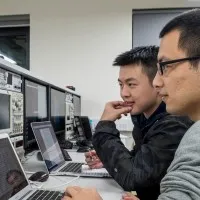
Computer Science
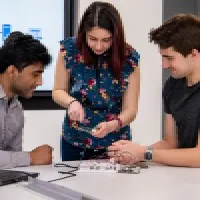
Computer Science

Computer Science with Artificial Intelligence

Computer Science with Cyber Security

Electronic Engineering with Computer Systems
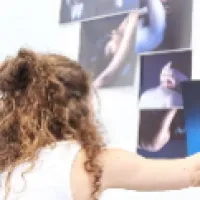
Fashion Design

Fashion Marketing with Management

Fine Art


